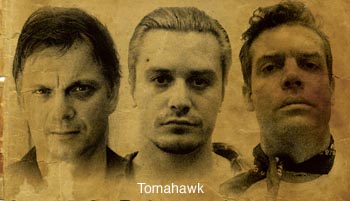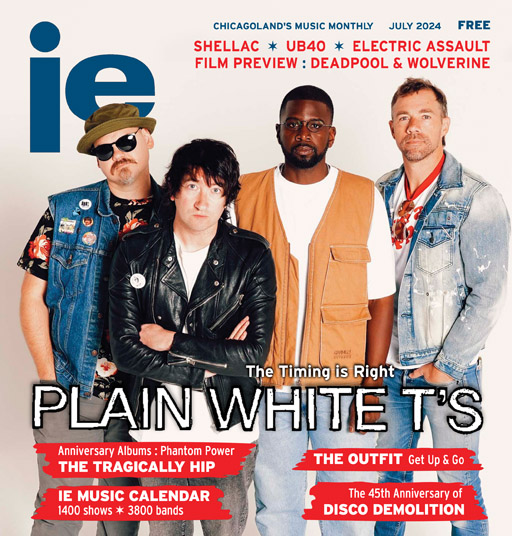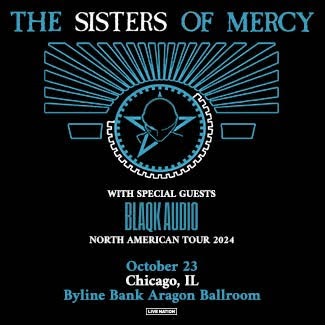Tomahawk interview
Tomahawk
The Living Past

Rock ‘n’ roll has never treated the past very kindly. In 1965 The Who looked at their elders and snarked, “I hope I die before I get old.” Sex Pistols took the sentiment one step further. In 1977 they cried, “No future for me,” and quickly got what they wanted. By the time Def Leppard released Pyromania in 1983, echoing, “It’s better to burn out than fade away,” we had gotten the message, loud and clear: Rock ‘n’ roll is revolution! Rock ‘n’ roll is white men in tight jeans!
Though rooted in the chords of black blues, rock ‘n’ roll abides by a European concept that further underscores its problem with skin pigment. The carefully measured influx of new bands each year is tantamount to the definition of time as a straight line, with a beginning and an end to everything: Out with the old, in with the new. The trends adjust accordingly. Music disappears. Cultures are forgotten.
According to traditional American Indians, who consider time as a circle that regenerates endlessly, such separation from the “living past” endangers the future. Everything exists in the present, they say. Even the dead.
Tomahawk singer Mike Patton (Peeping Tom, ex-Mr. Bungle, ex-Faith No More) and guitarist Duane Denison (USSA, ex-The Jesus Lizard) are inclined to agree with Native tradition, though you probably won’t find them reuniting their old bands anytime soon. You will, however, find their respective pasts — and the sound of American Indian music — alive in the blood of their historically minded new work with drummer John Stanier (Battles, ex-Helmet).
Anonymous (Ipecac) is an original vision of Native music run through two tiers of progressive rock. Denison and Stanier laid down instrumental tracks in Nashville before sending them to Patton in San Francisco for vocals and samples. The effort recalls the mouth-as-guitar singing style of Patton’s vocals-only solo debut and Denison’s elegant soundtracking of Walls In The City. Occasional balls-out Liar rage (“Sun Dance”) and creepy Mr. Bungle narration (“Cradle Song”) serve to satisfy fans of 2003’s Mit Gas and well-known previous bands. Though light on lyrics (“I go by the seat of my pants,” writes Patton by e-mail), Anonymous benefits from Denison’s intent to build modern arrangements from dormant, pentatonic-scale music.
“I found some collections of transcriptions of Native stuff from about 100 years ago. And the minute I saw it, I said, ‘Wow, this is killer,'” explains Denison by phone from his home in Nashville. “I could tell from just sight reading it . . . it had energy, it had momentum, it had weird, sort of melodic contours.” The classically trained guitarist discovered the material while searching through bins of old sheet music, which were littered with fakes and novelties. “Back then they called it, like, ‘race music’ or ‘minstrel music.’ And the Native stuff — the so-called ‘Injun songs’ — were seen as a part of that,” he says. “They’d mix it in with plantation songs and stuff like that, where you could tell the people who wrote it were probably white, and were just trying to make money for their publishing company.”
Denison and Patton differ in seriousness on the topic of Tomahawk’s third CD (their first recorded separately). Denison is part archivist, part audiophile. A silly Patton plays devil’s advocate from a laptop in Phuket, Thailand: “No research. No training. Just responded to the music.” When pressed for details, Patton responds in jest: “Once the peyote kicked in, I imagined all kinds of wonderful things! Unicorns, explosions, five-legged cats, circle jerks, beef jerky, the Lakers winning another NBA championship, beautiful mermaids with speech impediments — you know, same old stuff.”
With the “same old” Patton involved, is the American Indian foundation of Anonymous no longer authentic? Authentic isn’t the word, both members agree.
“I just do what comes naturally to me. If you think that’s authentic, great. If not, great too,” Patton writes. “The reality is that as soon as I grow concerned about outside issues, standards, rules, or trends, the music will be watered down.” Denison elaborates: “I’ll tell you straight up, there is nothing authentic about this album — other than the fact that the themes on which these songs are based are taken from the actual transcriptions. But come on, we’re using guitars, drums, samplers, modern recording technology. This is not an academic recreation of the real thing. It couldn’t be.”
So Anonymous isn’t the real thing. It’s not The Real Thing, either. It’s both states of being, each living in the present. It has been 18 years since Faith No More helped pave the way for the alternative ’90s with “Epic,” and Patton shows signs of breaking his own wacky mold. Questions about a Faith No More reunion went unanswered, and the singer writes that his “pop” act, Peeping Tom, is his main gig. But “he needs to be reined in,” Denison laughs.
“At this stage in my career I’m not much interested in novelties,” Patton writes. Before sending the e-mail, he changes his mind: “This is an entertaining form of art. I’m not trying to change the world. I’m not that pretentious. The world needs to laugh a little more, don’t you think?” Somewhere a goldfish flip-flops.
Denison is slightly more invested in the legacy of his ’90s powerhouse. He oversaw a new live DVD, The Jesus Lizard (MVD), which documents the hot-engine intensity of the Chicago band’s peak Down tour in 1994. A multicamera set-up and proper soundboard recording catches Denison and his rhythm section at their tightest. They stand in planned contrast to disheveled singer David Yow, who chastises and dives on top of a collegiate Boston crowd like some kind of unshaven, wasted uncle (“MIT!” he mocks as the band counts off into the noise-rock slate of “Puss”). It’s vintage Lizard duality.
“I was fairly proud when I saw it. You know, I hadn’t thought about that stuff in a long time,” Denison says. “There were no technical problems, which sometimes happened at shows, where [Yow’s] microphone cable would break three times in one song.” No sign of a violent mosh pit. No nudity. No obvious broken bones. “If you want to see [Yow] get hit in the head with a bottle, you can go on YouTube and see that. If you want to see him get thrown on the floor and dislocate some vertebrae, you can see that already — that’s already well-documented.”
YouTube and the DVD might offer the last live glimpses of The Jesus Lizard (who disbanded in 1999) despite the recent surge of noise-rock reunions (Scratch Acid, Big Black, and Slint have all played shows in the last year). Denison says the trend stops with him, though it could have turned out differently.
When asked recently by All Tomorrow’s Parties to reunite for a festival in England, Denison says he declined, regretting The Jesus Lizard’s omission from Touch And Go’s 25th Anniversary party last summer in Chicago. “The one we didn’t play,” he laments. (Yow did play the party with Scratch Acid.)
“Nobody ever really asked me if I wanted to do it or not. And to be honest, I was sort of miffed about that. I felt like I was not in the decision-making process — either with the label or the band,” Denison says. “And it just annoyed me to think that, ‘Oh, what? Well, we won’t play in front of our real friends and our fans in Chicago, but we’ll go across the ocean and play for a bunch of art losers so some snotty English magazines can write about us?’ No, I don’t think I will.”
But what about the fans?
“USSA will take back the night,” he announces, describing his new rock project with bassist Paul Barker (ex-Ministry). They have two shows under their belt already.
According to one circle, they’ll last forever.
— Mike Meyer










